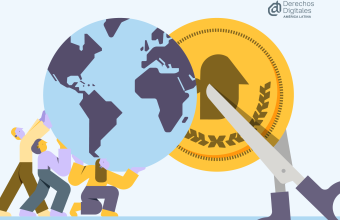Puede leer una versión en castellano de esta carta aquí.
The undersigned organizations and individuals we express our concern about the introduction of the Digital Platforms Regulation Bill Nº 14.561-19, which is being discussed in the Chilean Congress. The Bill, motivated by the need to balance the power of some technology companies and citizens, establishes rules that end up being dangerous for the exercise of fundamental rights on the internet.
In particular, we express our deep concern for the following reasons:
1. The initiative aims to regulate “digital platforms”, that are defined as “all digital infrastructure whose purpose is to create, organize and control, through algorithms and people, a space for interaction where natural or legal persons can exchange information, goods or services”. The concept is too broad and vague, and would include all kinds of services, regardless of their size or user base, their functionalities or purposes, or whether they are websites or mobile apps, proposing a single regulation for very different realities.
2. The initiative tries to innovate in matters of personal data protection, consumer rights and protection of the rights of children and adolescents. With this, it sets aside the current laws and legislative discussions on these other matters without seeking coordination with them, establishing separate rules that do not improve the general status of the protection of those rights.
3. The proposal presents a definition of “digital consumer” (article 3, letter d), focusing the protection offered on aspects related to consumers, ignoring social, political and cultural impacts beyond consumer relations that are linked to the use of digital platforms.
4. The proposal seeks to transfer the rules that govern the offline world to online platforms. But it does so through the creation of obligations and rules (article 6) that only hinder online operations and impose new responsibilities on intermediaries, generating incentives for content removal to limit those responsibilities. In this way, digital platforms are negatively discriminated against and their creation is discouraged, reducing competition and affecting the formation of new online interaction spaces.
5. The bill seeks to combat “manifestly false” information, addressing the disinformation phenomenon in a way that is disconnected from international experience. With this, it violates the guarantees to the human rights of freedom of expression and freedom of information without prior censorship, contravening the rules in force in accordance with the Inter-American human rights system.
6. Although the proposed introduction of “appropriate age verification mechanisms” (Article 8) is laudable in its purpose of protecting children, it ignores the fact that the proposal implies collecting more data from users for their identification.
7. The reference to non-discrimination introduced (article 9) is vague and disconnected of current regulations on the matter, imposing on the service provider the implementation of bias control mechanisms with respect to which no parameters are offered and that are finally left free to arbitrariness.
8. The bill attributes “strict liability” for all damages caused by a platform (article 15), in contradiction with its own rules of exemption from liability (article 6), and empowering the courts to double the compensation for such damages, creating in Chile the figure of punitive damages that has no legal recognition or consistency with the Chilean legal system. At the same time, imposing strict liability is contrary to the recommendation of the Office of the Special Rapporteur for Freedom of Expression of the Inter-American Commission on Human Rights, by stating that “a strict liability scheme in the field of electronic or digital communication is incompatible with minimum standards regarding freedom of expression”.
9. The proposal includes the possibility of temporary suspension or blocking of a digital platform, which directly contravenes the recommendations of human rights protection organizations to ensure and promote a free and open internet, and guarantee freedom of expression.
10. Finally, the regulation of digital platforms should promote deconcentration of power, transparency and accountability, not promote censorship and give more power to those who already have it as controllers of the technology.
For all the above, we ask the Chilean Congress:
- Not to persevere in the discussion of Bill No. 14.561-19.
- Initiate a new process of discussion on platform regulation, as a transparent, open and multisectoral debate, where all interested parties are able to participate, providing the fulfillment of Chilean government commitments to International Human Rights Law as the basis for any proposal.
Signatories:
- Daphne Keller, Director of Stanford Program on Platform Regulation.
- Sonia Livingstone, Professor, London School of Economics and Political Science.
- Ellen Helsper, Professor, London School of Economics and Political Science
- Dr. Cory Doctorow (h.c.), Tech activist, blogger, journalist, and science fiction author.
- Evgeny Morozov, author of “The Net Delusion: The Dark Side of Internet Freedom and To Save Everything”, “Click Here: The Folly of Technological Solutionism”.
- Glyn Moody, Writer. Author of “Rebel Code”.
- Jessica Fjeld, Assistant Director, Cyberlaw Clinic at the Berkman Klein Center for Internet & Society, Lecturer on Law, Harvard Law School.
- Jillian C. York, Director for International Freedom of Expression, EFF; Author of “Silicon Values: The Future of Free Speech Under Surveillance Capitalism”.
- Liza Garcia, Executive Director, Foundation For Media Alernatives, Philippines.
- Michael Karanicolas, Executive Director, UCLA Institute for Technology, Law & Policy.
- Prof. Arturo J. Carrillo, George Washington University Law School.
- Colin Maclay, Research Professor and Executive Director of USC Annenberg Innovation Lab.
- Gabriel Teninbaum, Assistant Dean of Innovation, Strategic Initiatives & Distance Education; & Prof. of Legal Writing at Suffolk University Law School.
- Dr. Verónica Donoso, Digital Literacy and Child Online Safety consultant.
- Micaela Mantegna, Artificial Intelligence, Ethics & Policy Prof. at the Center for Technology and Society, San Andres University. Affiliate, Berkman Klein Center for Internet & Society at Harvard University.
ARTICLE 19 (global).
Access Now (global).
Asociación por los Derechos Civiles (Argentina).
Asociación TEDIC (Paraguay).
Association for Progressive Communications (APC).
Center for Democracy &Technology (global).
Código Sur (América Latina).
Corporación Cambio Sostenible (Colombia)
Committee to Protect Journalists (global)
Dangerous Speech Project (global).
Electronic Frontier Foundation (EFF).
Fight for the Future (Estados Unidos).
Fundacion InternetBolivia.org (Bolivia).
Fundación Saber Futuro (Chile).
Hiperderecho (Perú).
Idec – Instituto Brasileiro de Defesa do Consumidor (Brasil).
Instituto para la Sociedad de la Información y Cuarta Revolución Industrial (Perú).
IFEX-ALC (América Latina y el Caribe).
Instituto de Desarrollo Digital de América Latina y el Caribe.
Intervozes – Coletivo Brasil de Comunicação Social (Brasil).
ONG Acción Constitucional (Chile)
Open Net Association (Corea).
OpenMedia (Canadá).
R3D: Red en Defensa de los Derechos Digitales (México).
Ranking Digital Rights (global).
Rhizomatica Comunicaciones (México).
SMEX (Oriente medio y norte de África).
Sursiendo, Comunicación y Cultura Digital (México).
Wikimedia Foundation (global).
Wikimedia Chile (Chile)
Wikimedia Colombia (Colombia)
World Wide Web Foundation (global).
Xnet (España).
Also:
- Laura Gougain.
- Pablo Bello.
- Claudio Ruiz.
- Silvana Pezoa.
- Malva Venegas.
- Oscar Bar.
- Virginia Gaete Quezada.
- Nicola Sagredo.
- Jacqueline Saldías.
- Raúl Arrieta.
- Daniel Pérez.
- Yasmin Pérez Muñoz.
- Ignacio Rodríguez Moreno.
- Antonio Sáez.
- Fabiola Torres Poza.
- Ivan “HacKan” Barrera Oro.
- Patricio Cabello. Investigador CIAE-IE Universidad de Chile, Director de proyecto Kids Online Chile.
- Mauricio Moris.
- Juan Jiménez A.
- Fernando Ahumada.
- Gabriela Iriarte Kamp.
- Javiera Yáñez.
- Jocelyn Simmonds.
- Ronald Javet
- Verónica López.
- Javiera Moreno, abogada, Directora de Datos Protegidos.
- Roberto Will Montoya Rodríguez.
- Francisco Javier Rigual Cótua.
- Paulina Villalobos.
- Carolina Gainza Cortés.
- Andrea Toro.
- Pablo Gonzalez.
- Matías Eyzaguirre Miranda.
- Luis Lineros.
- Iván Valdés.
- Ignacio Rodríguez de Rementería.
- Sebastián Smart.
- Felipe Ovalle.
- Gonzalo Niño Guggisberg.
- Marianne Díaz Hernández.
- Javier Bravo Salas.
- Jean Ortiz Franco.
- Manuel Mejías Pérez.
- Michel Inostroza.
- Franco Fasola.
- Santiago Arango.
- Ricardo González.
- Felipe Osorio Umaña.
- David Órdenes.
- Francisco Tapia.
- Francisco Arias.
- Diego Echaiz Leiton.
- Paulina Silva, abogada. Socia de Bitlaw.
- Roberto San Martín Godoy.
- Marcela Tyrer S.
- Christian Retamal.
- Andres Junge.
- Claudio Jofré Larenas.
- Andres Sanchez Matus.
- Bárbara Oliva.
- David Aragort.
- Frederico Ferreira.
- Tomáš Hozman.
- Maria Smith.
 WhatsApp
WhatsApp Inteligencia y vigilancia estatal
Inteligencia y vigilancia estatal Fondos de Derechos Digitales
Fondos de Derechos Digitales